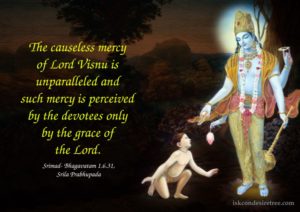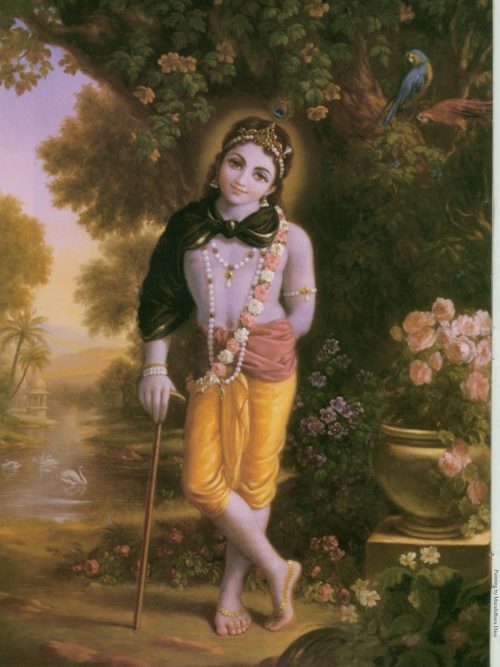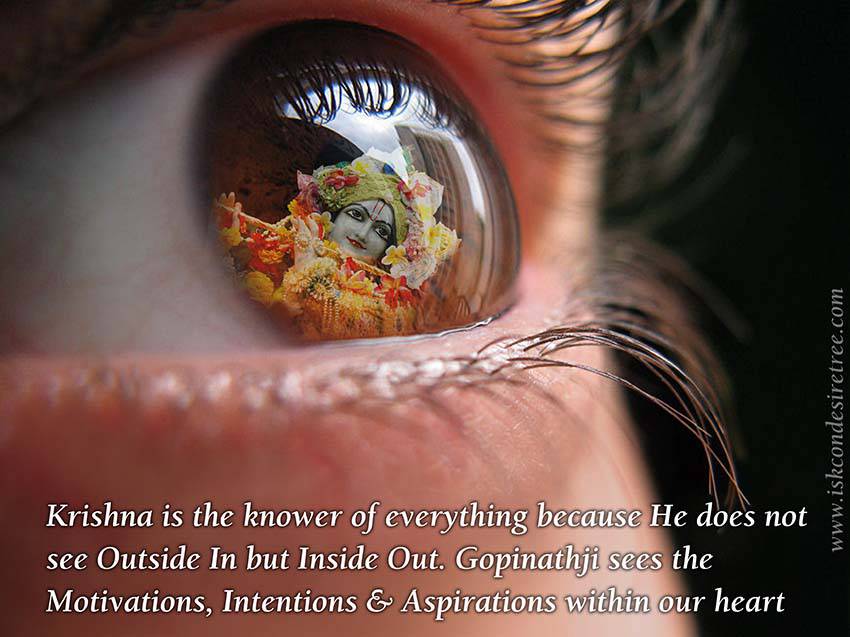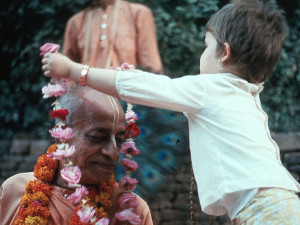Is God unfair ?
“Why God has made somebody so opulent and why somebody so poor?” This is the general question we hear. Does God discriminates between different souls? Srimad Bhagavatam clears the doubt
naiñä parävara-matir bhavato nanu syät
jantor yathätmä-suhådo jagatas tathäpi
saàsevayä surataror iva te prasädaù
sevänurüpam udayo na parävaratvam
“Like the ordinary living entity, my Lord, You have no such discrimination, thinking like ‘He is my friend; he is my enemy, he is favorable, he is unfavorable.’ Such conception of low grade and high grade You have not got. But according to one’s gradation of service, You offer them benediction exactly like the desire tree offers fruits according to the desire of the person. The desire tree has no distinction of low-grade and high-grade position of the beggar.”
(SB 7.9.27)
God is Absolute
Parävaratvam. Para means “better,” and apara means “inferior.” Superior and inferior. There are two things, superior and inferior, everywhere, but in the eyes of God, Krishna, there is no such thing superior or inferior. He’s superior, and everything is superior. This should be understood. There is no such discrimination that “Here is a devotee, so he’s superior, and here is a non-devotee, he’s inferior.” That is not God’s discrimination; that is your discrimination.
How is that?
If you like to remain as inferior, you can remain. God has given you independence. And if you like to become superior, you can become superior. It is not God’s discrimination; it is your discrimination. Mind this verse very carefully. Krishna says that “You fully become dependent upon Me, and I shall give you full protection.” This is superiority. As soon as I fully surrender to the supreme superior, Krishna, then my position is immediately superior. But if I don’t do that, then I remain inferior.
There is a verse in the Bhagava gita, ye yathä mäà prapadyante täàs tathaiva bhajämy aham (Bg 4.11- As all surrender unto Me, I reward them accordingly.) “It is up to you to… If you surrender cent per cent, then I am also fully cent per cent for you.” But if you have got discrimination—”Certain percentage for my wife, certain percentage for my children, certain percentage for my country, certain percent…,” so on, so on, so on, so on, ultimately, “Zero for God”—then God is also zero. It is up to you. But if you take God—”You are my everything”—then He is also for you, everything. It is up to you. Parävaratvam. He does not discriminate; you discriminate.
Can we understand this via an example?
There are many persons, they come to Vrindavan, and whatever they have earned throughout the whole life, so they give everything to the wife and children and make contract that “I am going to Vrindavan. You send me at least two hundred rupees for my expenditure.” “And what about two lakhs and crores?” “Oh, that is yours. The two lakhs and crores, what I have earned, that is for you, my dear children, my dear wife, and you give me two hundred for God. So I am going to Vrindavan.” So Krishna is very intelligent: “All right, I am also for you two hundred.” Ye yathä mäm… This is the meaning, real meaning.
Srila Prabhupada calls it…
It is called…Responsive cooperation. “If you have surrendered to Me cent per cent, then I respond cent per cent. If you have surrendered twenty-five percent, then I respond twenty-five percent.” This is the position.
Mahajans know it!
Prahlada Maharaj knows it, that naiñä parävara-matir bhavato: “You have no such thing as discriminating.”
I am very fallen but why can’t God show more compassion?
So one may say that “I may… I am foolish. I may not surrender to Krishna cent per cent, but why He is not kind cent per cent?” So that is Krishna’s discrimination. Why He should? He can. He can become cent per cent, but He does not do so. That means Krishna is senscient; He is not impersonal. Don’t think that whatever you are doing, Krishna cannot see. In the Deity room, if you think that “This Deity is made of brass. Whatever nonsense I can do, He does not see,” no, He can see everything. Aïgäni yasya sakalendriya-våttimanti paçyanti pänti kalayanti [Bs. 5.32]. He sees. You rascal, you do not know how Krishna sees. You think that “He has these brass-made eyes. He cannot see. I can do all nonsense with…” No. That is not. He can see everything. Paçyanti pänti. Aïgäni yasya sakalendriya-våttimanti. He can see with His lotus feet. He can see with His hand. We can see simply with our eyes, but Krishna can see with all the… Aïgäni yasya sakalendriya-våttimanti. You have seen: Krishna is playing the flute. The fingers are open. A finger touching: “What you are doing?” We do not know the fingers can also see. But this is absolute. Krishna can use His any energy, any power, any part of the body, for anything else. This is Krishna. Aïgäni yasya sakalendriya-våttimanti. So Krishna can see within our mind how much we are surrendered and how much we are after material enjoyment.
So what should we do?
Therefore the best thing is we have to make zero. Anyäbhiläñitä-çünyam Çünyam means zero. Unless we make everything zero, simply Krishna fact… Krishna is the only fact, and everything zero.
Zero !!!
Without Krishna, everything zero. Just like one is one, and zero is zero, but when zero is added with one, it becomes ten immediately—ten times. Similarly, this material world is zero, and Krishna is one. If you want to enjoy the material world by your own effort, it will always prove zero. You’ll never be satisfied. But you add this zero by the side of Krishna, you enjoy like anything, ten times. Ten times. With zero it is zero, but when it is added with Krishna, it is ten times. Just see practically. Our Krishna consciousness movement was started with forty rupees. Now that forty rupees or something added with Krishna, it has become forty crores. You see practically. When I started for your country, I came to Mayapur. I offered my obeisances to my spiritual master, then I went. At that time I had no money even to purchase the ticket. And after that, I have come with forty crores. This is the secret: ye yathä mäà prapadyante
And the result will be…
If you fully surrender to Krishna, then Krishna is there. You have to learn how to take from Krishna. Of course, a devotee is never desirous to take anything from Krishna. He wants to give only. This is pure devotee. A pure devotee wants, “Krishna, whatever little I have got, You take it, everything.” And Krishna says, “Yes, because you have given your everything, even up to your life, I’ll also give you My everything to you.” This is Krishna.
God is like a wish fulfilling tree!
Krishna has no discrimination, but it is up to us to know how to take from Krishna. Just like the example is given here that saàsevayä surataror iva. Surataror iva. Surataroù means the desire tree. It is described in the Brahma-saàhitä, desire tree. Cintämaëi-prakara-sadmasu kalpa-våkña [Bs. 5.29]. That is kalpa vriksha….. kalpa vriksha there is in the higher planetary system, and especially in the Vaikuntha world. There are trees are kalpa vriksha, because everything is spiritual; nothing is dead. Here you can take some fruits or flower from a particular tree, but there, if you like, you ask kachoré and samosä from a tree—you get. But we have no idea what is surataroù, surataroù, what is kalpa Vriksha. Whatever you desire, you’ll get it. Surabhéh, surabhér abhipäl… The cows are surabhi. Here you have got limitation; you can milk morning and evening to a certain extent. But there the cows are surabhi. Surabhi means you can milk as many times as you like, and as much milk you want, you can take it. But these things are there, but we have no information. We are struggling here. Manaù-ñañöhänéndriyäëi prakåti-sthäni karñati [Bg. 15.7]. Because we are fools and rascals, we are trying to make some adjustment here. That is not possible.
It is duùkhälayam açäçvatam. This is mäyä. We are trying to be happy in this material… It will never be possible. But these fools and rascals, they do not know. They are making big, big plans how to become happy, how to become, in our country, in our home, in our society, in our family, and so on, so on, so on. This means we are simply becoming entangled. Ato gåha-kñetra-sutäpta-vittair janasya moho ‘yam [SB 5.5.8]. Ahaà moha, illusion. It will never be possible. Therefore, the conclusion is we should fully surrender cent per cent to Krishna, and then we become happy. Saàsevayä surataror iva te prasädaù.
The example is: just like the desire tree, kalpa Vriksha. It can fulfill any desire, any desire. We have got so many desires. Krishna can fulfill all the desires. Please surrender to Krishna. This is the process.
Conclusion
Pure devotion means first of all you learn not to order Krishna, “Krishna, give me this, give me that, give me that.” Don’t bother Krishna. That is the beginning of spiritual life. Anyäbhiläñitä-çünyam. You prepare to carry out every order of Krishna. Then it is spiritual life. Don’t make Krishna your order-supplier. You become order-supplier of Krishna.
If you learn how to give service to Krishna cent per cent, then you get everything, everything, without asking. Krishna knows everything, what is required for you. Just like a father knows what is the necessity of the child. The child never begs, “Father, give me this, give me that.” No. He’s simply dependent on parents. The parent knows. Similarly, if we become cent per cent dependent and serve Him faithfully under His order or His representative’s order, then the success is sure.
( Srila Prabhupada lecture, March 5 , 1976, Mayapur)
Now the amazing thing is that all of the above is simply transcript of a lecture given by Srila Prabhupada, I simply copied it ‘as it is’, the language, even the sequence of the paragraphs. I have only inserted questions based on each para! It is simply an amazing lecture, full of gems. We can hear the original audio of this lecture here. Transcript of the complete lecture is here.
If we simply read the transcript carefully and repeatedly or hear the audio with sincerity and attention then we can get many keys to make a very rapid progress in Krishna consciousness and surrender to Krishna.
All glories to Sri Guru and Gauranga.
All glories to Srila Prabhupada.
Your servant,
Giriraj dasa








